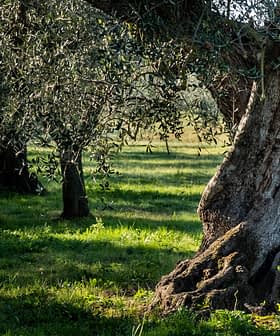The winning generation of Italian extra virgin olive oils has its roots in tradition and its head pointed to the future. The heart beats for EVOO of the very highest quality, in small niche productions and large manufacturers with modern and attractive concepts aimed at international markets.
This is a huge added value. I have received many phone calls of congratulations.
The 2015/2016 harvest season has seen the resurgence of Italy. After the annus horribilis and one of the worst olive oil production seasons ever in terms of quality and quantity in 2014/2015, Italy has regained its leadership, winning more awards than any other country at the 2016 New York International Olive Oil Competition.
See Also:This Year’s Best Italian Olive Oils
More than 820 brands from 26 nations around the world were evaluated by a panel of super judges in the largest olive oil competition ever held. There were 184 submissions from Italy, earning 109 awards with a rate of success of 59 percent (47 percent in 2013 and 43 percent in 2014, both years second after Spain) and with 6 Best in Class, 75 Gold Awards and 28 Silver Awards, beating the other nations in all categories.
Spain came in second place, with 78 awards out of 157 samples and a rate of success of 50 percent, followed by the United States which submitted 121 entries and won 50 awards with a rate of success of 41 percent achieving an excellent third place.
“This time, the winningest country is Italy,” announced Curtis Cord, president of the NYIOOC. “A remarkable achievement by Italian producers who suffered one of the worst harvests in recent history just a year ago.”
At the press conference where this year’s winners were unveiled, were present Olivier & Co.‘s Rose Malindretos, the representative for Il Fornacino which obtain a Gold Award, Amanda Kenny from Domenica Fiore, which won 3 Gold Awards, Lucia Verdacchi Pinelli of Fontantaro Estate, which obtained a Gold Award, Claire Treves Brezel of Casale Sonnino which won a Silver Award and Giuseppe Taibi with his Olio Taibi Nocellara del Belice which received a Silver Award.
This year the Italian production of extra virgin olive oil not only returned to the usual amount but also reached excellent results in terms of quality. It means that farmers were not discouraged and reacted to the previous year’s losses with even greater commitment and determination to tackle the new complications and obtain the best products possible.
“Watching the press conference broadcast live in Italy at night and discovering that we received the Gold award was an unexpected and great satisfaction, especially since it was our second year of production. For our showcase, this is a huge added value. I have received many phone calls of congratulations,” revealed Alessandro Donati of Doro83.
The olive trees have grown on his family’s estate in Moricone (Latium) for generations but they started this new line 14 months ago, in the midst of the terrible harvest in 2014.
“We adapted to the critical moment and we have tried to make the best of things,” Donati added. The previous year the fly was impossible to prevent, combined with fungi and mildew that destroyed up to 70 percent of the harvest. “This year finally the weather was fine, it was the perfect season. We monitored the fly with biodynamic and used various organic fertilizers, and we have achieved this excellent goal.”
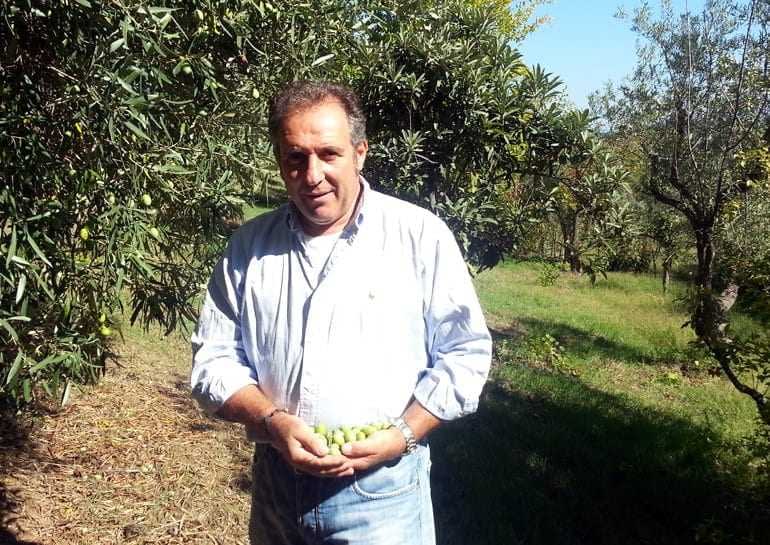
Piero Caruso, Le Colline Bio
Le Colline Bio had already been successful in the past years at NYIOOC. The owner, Piero Caruso, said that this success is due to years of experience. “We are the third generation of producers in Calabria, and a combination of studied details, like a perfect pruning and the use of natural treatments led to this great result.” Despite the fly that had undermined the amount of fruit he could press, Caruso obtained a product of high quality anyway. “But this harvest, favored by the right climate and with a few precautions, has been more than satisfactory and we have the pleasure of this great Silver Award,” said Caruso
Some manufacturers reached their goals through the use and evolution of the latest generation of technologies, particularly when it came to the milling equipment:
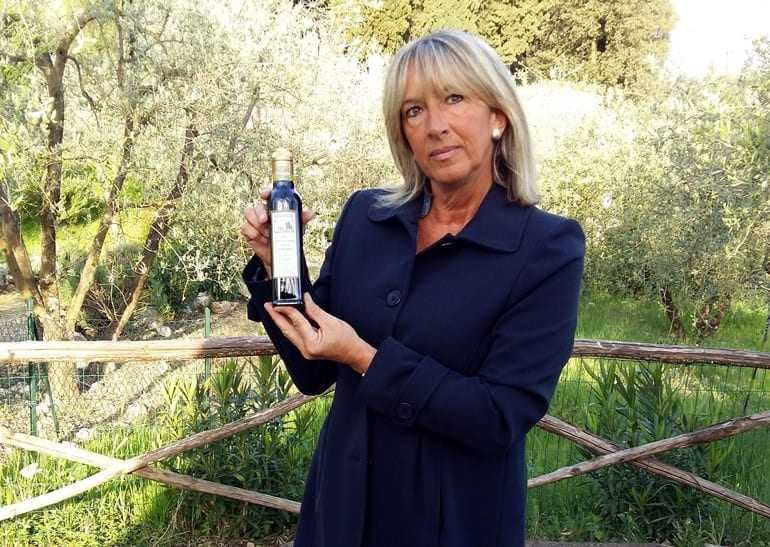
Best in Class winner Flavia Paoletti for Verde del Colle
The Best in Class winner Verde del Colle from Tuscany is produced with an ultramodern mill. “We already won awards in previous editions of the NYIOOC but this recognition is the greatest reward we could obtain,” said Flavia Paoletti.
“We use a mill with vertical kneading and a technology that allows us to work with regulated temperatures,” she explained to OOT. “This involves the need to operate with low yields, which decrease with the reduction of temperatures.” After the harvest, both manual and mechanical with facilitators, they deliver the olives to the mill within four hours. Different monovarietal crushings are then assembled to give an exceptional blend with a high content of polyphenols.
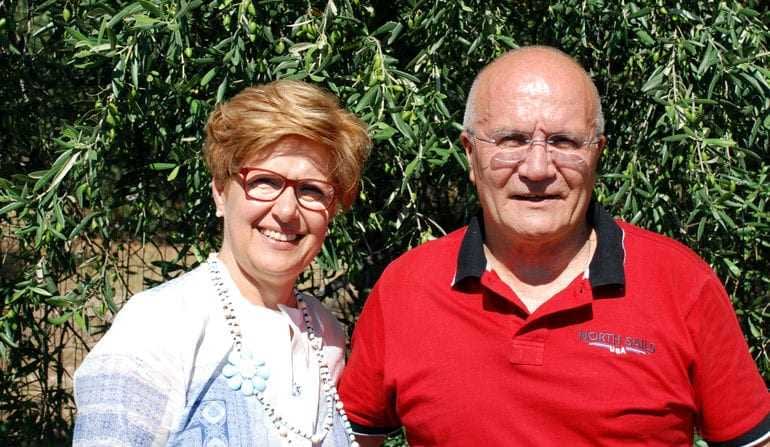
Gran Pregio Bio producers Maria Caputo and Altomare Mauro
Altomare Mauro and Maria Caputo manage an olive grove and an olive press in Molfetta (Apulia), where is produced their Gran Pregio Bio. “We are proud and gratified by this award. We already got a Gold Medal at the NYIOOC and this award confirms our commitment to quality. We have done a great job,” declared Altomare. “This award will be a springboard for the American market.” The previous year, even more devastating for organic production, did not intimidate them and they started to constantly monitored their olive grove. The excellent climate this season helped, but Altomare revealed that the great result is also due to the careful management of his modern mill which requires constant upgrades.
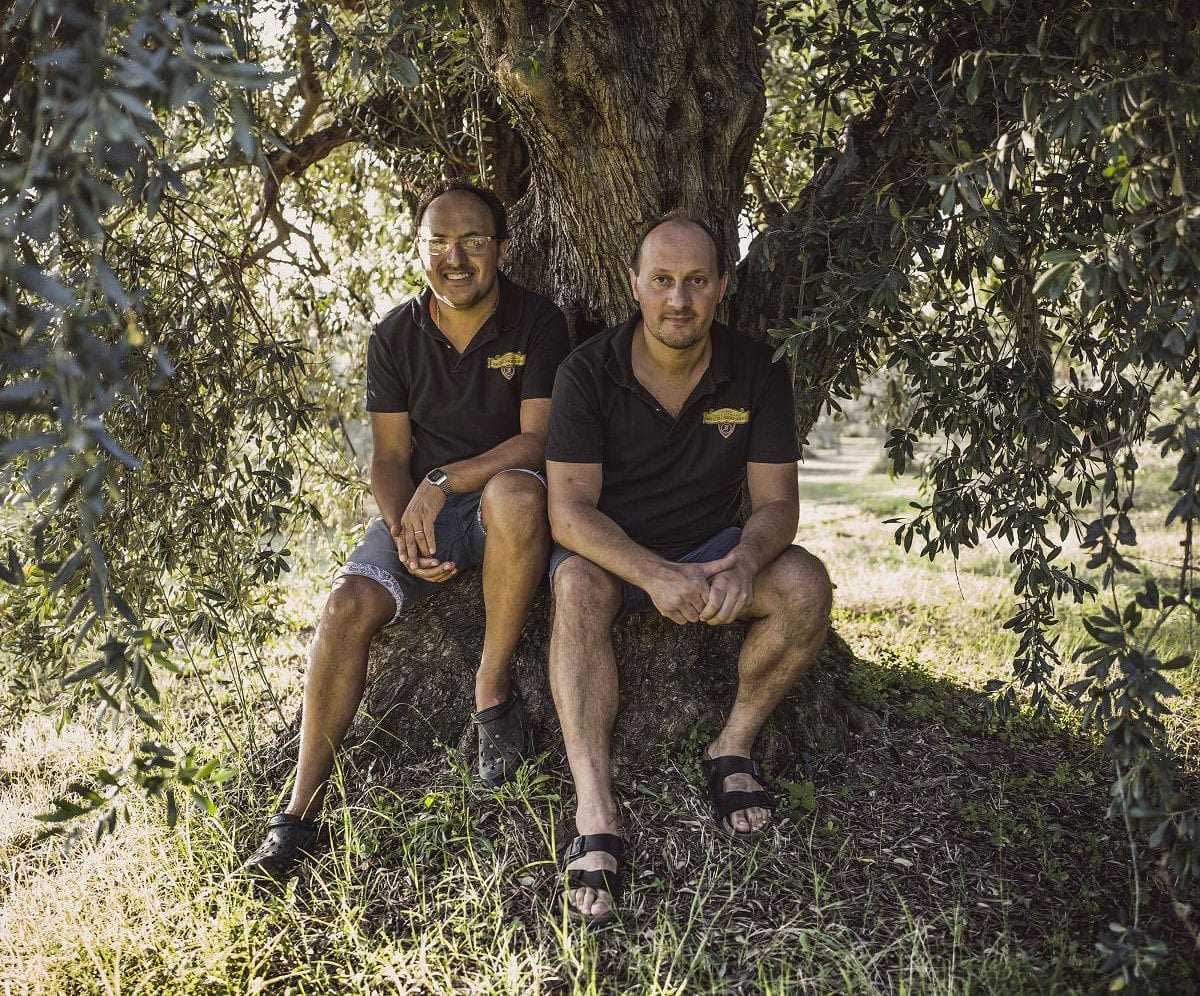
Fonte di Foiano
“We are so glad of this Gold Award,” Paolo di Gaetano declared. “The harvest 2014 was the most difficult ever. The last one was very easy to afford, since we had to face only a light drought and a small outbreak of fly for which we used just one treatment.” The Fonte di Foiano olive groves are located on the Tuscany hills. The olives, partly from secular plants, are delivered to a new generation mill which is constantly modified and updated. The technological power and the extraction steps are critical, according to di Gaetano. “I think that they can impact the success of the extra virgin olive oil up to 80 percent,” he considered.
Some manufacturers apply methods based on a sustainability, inspired by tradition:
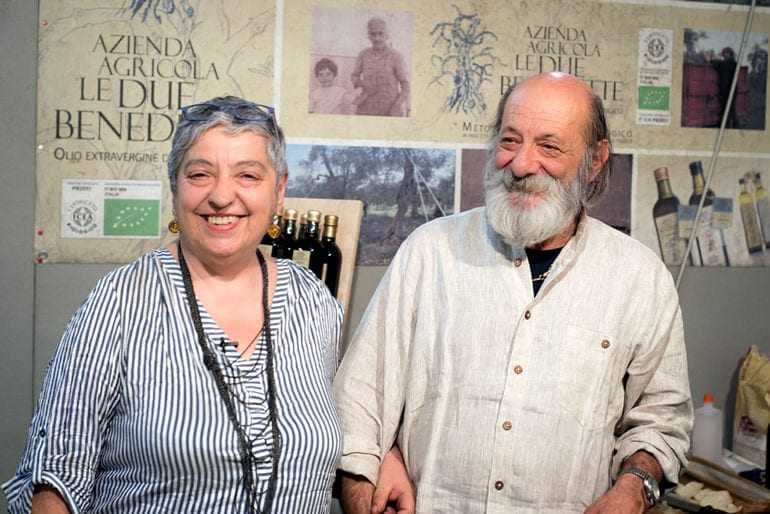
Le Due Benedette
“Our small olive groves treated with traditional methods rewarded us with those two great Gold Awards,” affirmed Benedetta Stallone De Santis of Le Due Benedetta from Apulia, which won two Golds with its Gianmorulo, an EVOO with a prevalence of Ogliarola; and Peragineto, prevalence of Coratina.
“Scientific studies that have found that the fly cannot see the white color and I found that the kaolin, that is white and very natural, protects more than all the other products,” she revealed. In 2014, they completed three spreadings of kaolin and due to cold during the fruit set, an absence of pollinating insects, and hail before the harvest they produced only 1,500 liters. This year they reached 6,000 liters due to favorable climatic conditions, no droughts, and no rains at the wrong times. “We are not only biological but we completely avoid the few permitted chemical products, continuing the natural and organic tradition of my grandmother, which I have known and respected,” she affirmed. “This harvest we only needed an early spraying of kaolin because of a small outbreak of fly in July, then the weather was good and we obtained these ambitious awards.”
Massimo D’Addario, an olive oil expert and son of the owner Marina Palusci, is part the fourth generation of producers. “It was the first time we participated and we got this remarkable achievement,” he said to OOT. “Last year, despite the terrible harvest we did not give up, and despite the 60 percent drop, we produced an excellent EVOO. This year we just had to irrigate because it was very warm in Abruzzo.” D’addario explained that a good irrigation is needed to keep a good pulp-to-core ratio and to maintain the freshness of the scents that distinguishes their EVOO, manufactured by a two-phases mill cold and not filtered.
Some producers gave a touch of cool contemporaneity to tradition, but did not miss the importance of organic and sustainable treatments.
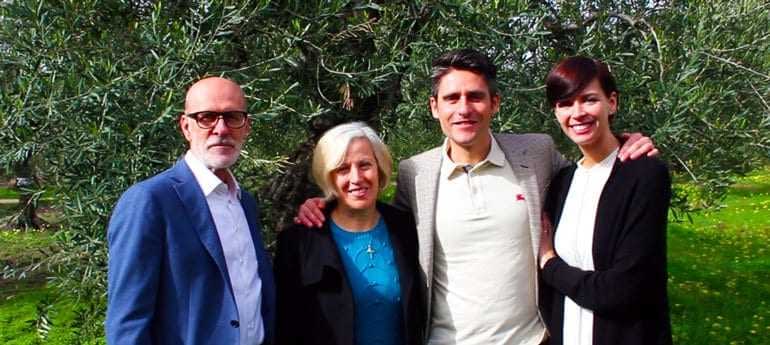
The Borraccino Family of Oilala
Spiros Borraccino and his brother created the name Oilalà reworking the French word ‘olalà’, that means awe and wonder. They used a bottle usually dedicated to spirits with a captivating and innovative aesthetic graphics that changes every year. “We have 10 hectares of olive groves on the Adriatic coast of Apulia inherited from our grandparents,” said Borraccino. “We are happy and proud of this award. Since last year we have not been able to participate because of the poor harvest, we are so glad of the goal we reached this year. Our production mainly points to foreign markets and this award consolidates our reputation.” After the previous harvest, they started to monitor much more diligently, almost weekly, for the presence of fly. Only a week in July made them fear the onset of the fly which turned out okay. Oilalà uses organic product although is not certified as organic and does not use chemical treatments when is not necessary.
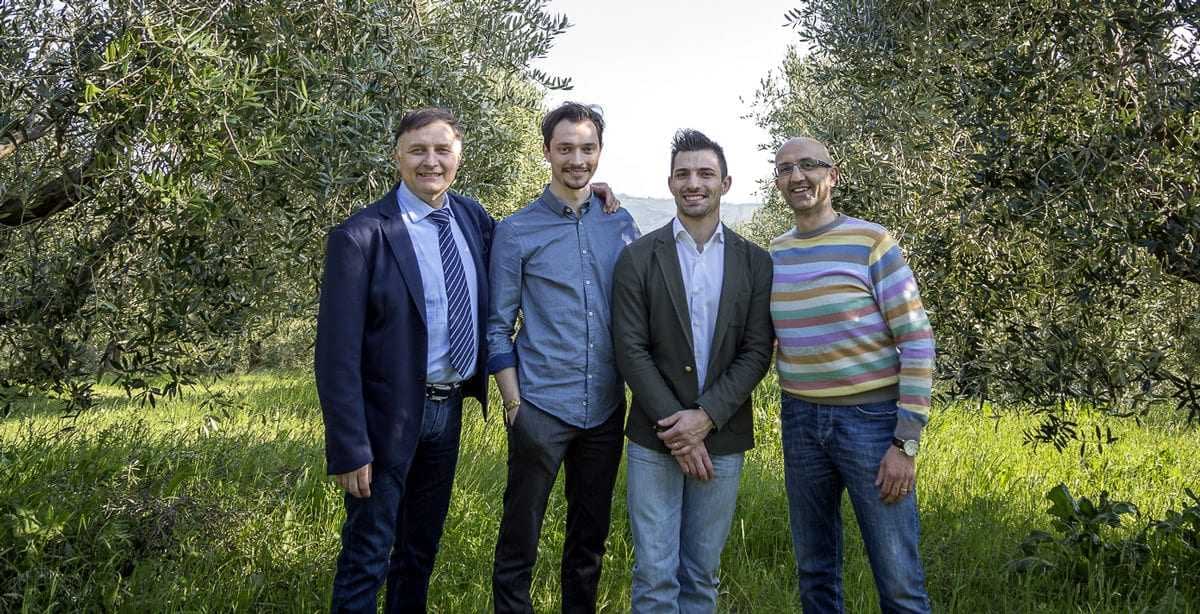
The Agostini family of Sublimis
“It is the first time that we participated in the NYIOOC and we are so glad about this award and prestige that it give us at the international level, since in the last two years we are on the US market,” said Alfredo Agostini who won a Gold Award with Sublimis, that comes from an olive grove at 350 meters above sea level in the Marche region. “During the 2014 harvest, we had a 50 percent drop in quantity. This year we performed natural preventive treatments with copper for the conventional production since we prefer to avoid chemical products. But the olives were so healthy that no additional treatments were needed and this has given great results.”
Costantino Russo, owns with his sister, Rosa Russo, a farm near Sorrento where they produce L’Arcangelo named for their father, without whom it would be impossible to produce their EVOO, Costantino revealed. “The Gold Award is an important recognition of our commitment. Our olive groves, partly secular, grow at 250 meters above the sea level in a limestone-clay terroir.” He borrowed from the world of wine a system of meticulously sorting the olives on a sorting table. Last year they obtained only 20 percent of usual production. “In order to deal with any attack we have constantly monitored the fly. Although we are not certified as organic we use organic products such as copper and lime and we spread them every 3 weeks and do the early harvest in October. I really care about this award since it is prestigious and is the most important competition for extra virgin olive oil.”




